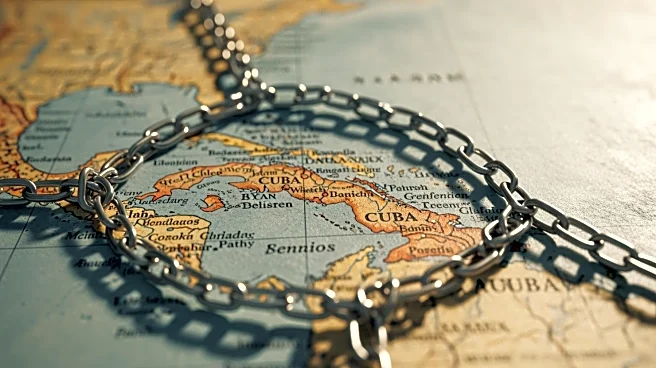What's Happening?
The U.S. embargo against Cuba, which has been in place for decades, continues to significantly impact the Cuban economy. The embargo, initially imposed in the early 1960s, has been reinforced by successive
U.S. administrations, including the Trump administration, which introduced over 240 new sanctions. These measures have restricted Cuba's access to international financial markets and limited its ability to import essential goods. The embargo has been a major factor in Cuba's ongoing economic crisis, contributing to shortages of basic necessities such as food, medical supplies, and fuel. Despite some attempts at rapprochement during the Obama administration, the embargo remains a significant barrier to economic development in Cuba.
Why It's Important?
The U.S. embargo on Cuba has far-reaching implications for both countries. For Cuba, the embargo has stifled economic growth and development, exacerbating shortages and economic hardships for its citizens. For the U.S., the embargo represents a longstanding foreign policy stance that has been criticized by the international community, as evidenced by repeated UN resolutions calling for its end. The embargo also affects U.S. businesses that are unable to engage in trade with Cuba, potentially missing out on economic opportunities. The continuation of the embargo reflects broader geopolitical tensions and the U.S.'s historical approach to dealing with socialist regimes.
What's Next?
The future of the U.S. embargo on Cuba remains uncertain. While the Biden administration has made some moves to ease restrictions, the embargo's core elements remain intact. Any significant change would likely require legislative action, which could be influenced by shifts in U.S. domestic politics and international relations. The ongoing economic challenges in Cuba may also prompt further international calls for the embargo's end. However, entrenched political positions in the U.S. suggest that any change will be slow and contentious.
Beyond the Headlines
The embargo on Cuba raises important ethical and humanitarian questions. Critics argue that it disproportionately affects ordinary Cubans, limiting their access to essential goods and services. The embargo also highlights the complexities of U.S. foreign policy, where economic sanctions are used as a tool to influence political change. The situation in Cuba serves as a case study in the effectiveness and morality of such measures, prompting debates about the balance between political objectives and humanitarian impacts.










